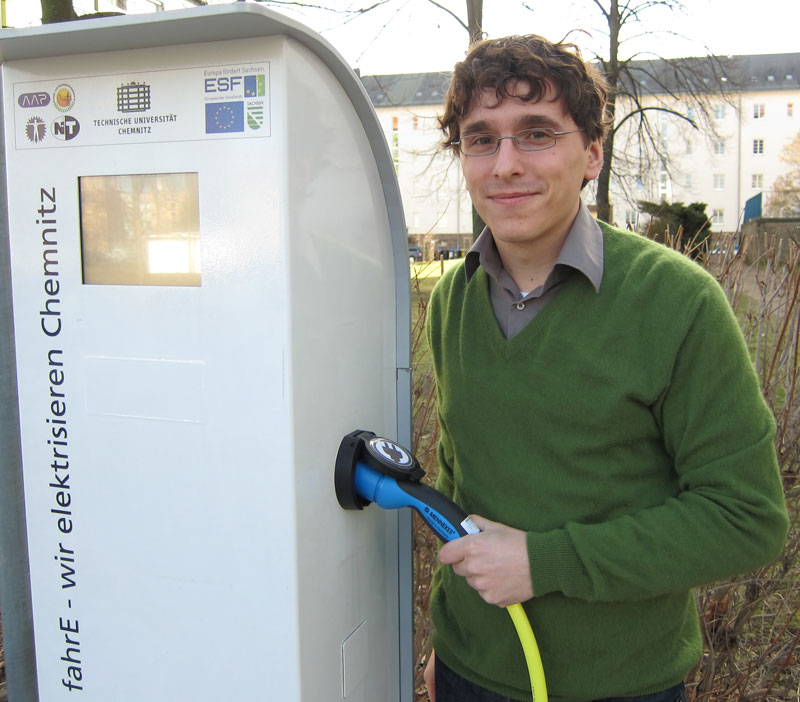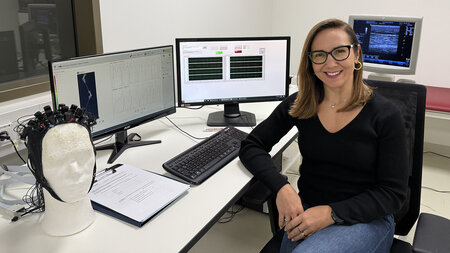Reaching the destination without range stress
Thomas Franke examined in his doctoral dissertation at TU Chemnitz how drivers experience electric vehicle range - results can potentially be generalized to the interaction with limited resources
-

How do users of electric cars decide when to fill up their range resources again? This was a topic of the doctoral dissertation by Thomas Franke at the Professorship of Cognitive and Engineering Psychology. Photo: David Kühnert
Users with a typical German daily mileage get along well with the range of electric cars. However, the optimal utilization of range resources is quite a challenge for many drivers. This is one of the results of the dissertation that the psychologist Thomas Franke completed at the Faculty of Behavioural and Social Sciences at Technische Universität Chemnitz. Therein he reveals that usually 20 to 25 percent of the available range resources of electric vehicles are lost as a psychological safety buffer. Assistance systems could help to close this gap. "The results of the dissertation are highly relevant for the development of electric mobility systems," Prof. Dr. Josef Krems states. The chair of the Professorship of Cognitive and Engineering Psychology supervised the `summa cum laude´ dissertation and emphasizes: "Because of the developed theoretical framework the dissertation also contributes to a generally better understanding of the interaction with limited resources. And this is a fundamental issue of our time."
`Range experience is highly subjective´
The results are based on more than 400,000 km electric user experience, which were gathered in the research project `MINI E Berlin powered by Vattenfall´. The project was funded by the Federal Ministry for the Environment, Nature Conservation and Nuclear Safety. The Professorship of Cognitive and Engineering Psychology of TU Chemnitz was involved in the project from the start, alongside with BMW and Vattenfall and other university partners. During the field study a total of 79 users drove the MINI E for six months. The psychologists of TU Chemnitz conducted qualitative interviews at several points in time. In addition, questionnaires, diary methods and data loggers were used.
"It has become evident: Various psychological factors contribute to the pattern that a certain technically available range translates into a different usable range for each user," Franke comments and summarizes: "The range experience is highly subjective”. This is caused on the one hand by the competence in dealing with the range - users who have understood the range dynamics of the vehicle can control the range more effectively. On the other hand the question is: How big is the individual preferred safety buffer? "In this context, of course, also personality plays a role. For example: Does a user generally believe that he can solve technical problems based on his skills or does he rather believe that this happens by luck or chance," explains Franke, who describes three psychological range levels in his dissertation: The `competent range´ is the maximum achievable range for a user, the `performant range´ is the average available range on an everyday basis and the `comfortable range´ is the one that is actually used by the driver with a good feeling. Therefore the objective for further development is to help drivers to fill any gaps between these range levels and thereby to finally have more usable range if needed without sacrificing driving pleasure.
Controlling range must be easier for the driver
Hence, the range is typically utilized only suboptimally. "This implies that the primary objective of vehicle development should not be to increase battery capacity but to increase the comfortable usable range for the driver," Franke sums up and emphasizes: "If you consider how much increasing the technical range of electric vehicles by 20 percent costs today, it is very promising if one could achieve such an increase potentially also through optimized information and assistant systems." Herein it has been revealed to be important that the driver can subjectively control the range - meaning that there have to be visible and easily accessible options to extend the range by the touch of a button, if need. For example, the provision of different driving modes that produce more range when selected is a promising strategy.
Some of these results may not only be applicable to electric vehicles. "It is quite plausible that some pattern of results and concepts can be transferred to other situations in which people interact with limited resources," Franke says. Examples range from the use of smartphones and other mobile battery-powered devices to the question: When do I fill up my fridge?
Electric car drivers seldom experience range stress
The results of the doctoral dissertation also show that users of electric cars, who have a mobility profile that is typical for Germany, rarely experience range stress. "During the first drives, users are often still uncertain and may not feel very comfortable during their first trip with longer distances," Franke reports. However: "This changes as soon as they have driven the first longer distances with the electric car and they get a feeling of the range development under different conditions and what kind of strategies help to extend the range if needed." Dealing with the range is thus rather characterized by the avoidance and not the experience of range stress. "At the beginning of the doctoral dissertation there were hardly any publications on the everyday range experience and behavior of electric car users. The objective therefore was to gain a detailed and theory-driven psychological understanding of this topic," Franke says.
The dissertation `Sustainable mobility with limited resources: Experience and behavior in dealing with electric vehicle range´ is available at: http://nbn-resolving.de/urn:nbn:de:bsz:ch1-qucosa-133509
For further information please contact Thomas Franke, phone +49 (0) 371 531-37589, Email thomas.franke@psychologie.tu-chemnitz.de
Mario Steinebach
21.02.2014





